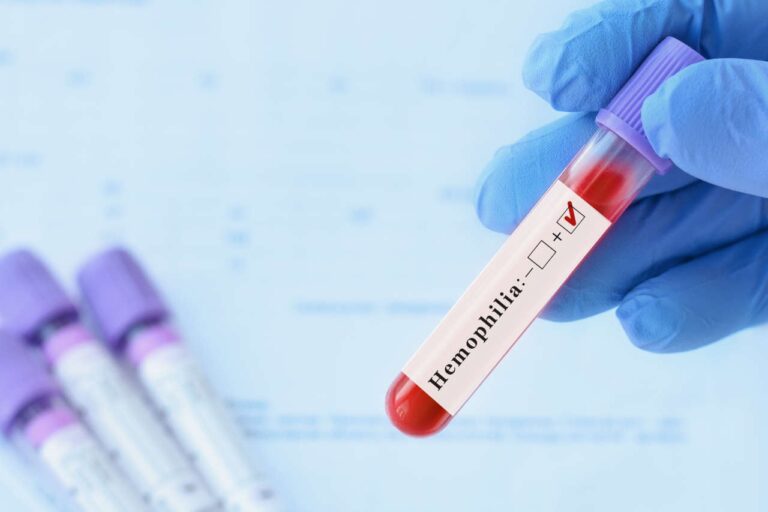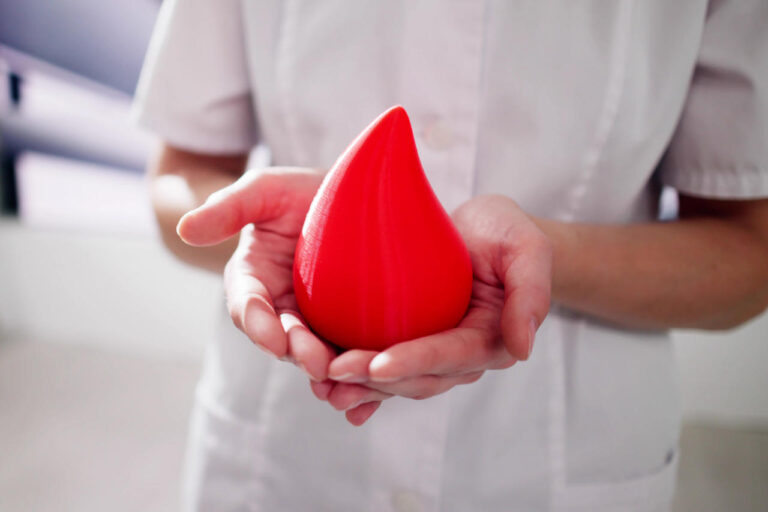
Knowing about hemophilia risk factors can help reduce your risk of developing complications.
Discutați cu un specialist despre asistența pentru coplată
What Is Hemophilia?
Hemophilia is a group of hereditary bleeding disorders. It happens when your blood contains little or no blood-clotting proteins called clotting factors. As a result, your blood cannot clot properly, which leads to excessive bleeding.
The exact number of Americans living with hemophilia has yet to be determined. The Centers for Disease Control and Prevention (CDC) estimates that 33,000 males in the United States suffer from this disorder. Nearly 400 babies are diagnosed with hemophilia A (a type of hemophilia) at birth each year [1].
What Are the Complications of Hemophilia?
- Excessive and prolonged bleeding, even without an injury or trauma
- Internal bleeding (bleeding in a vital organ such as the brain can be fatal)
- Bleeding into the joints (can cause chronic joint pain and swelling)
Hemophilia Types
Several different types of hemophilia are described in medical literature. Among them, the two most common are:
- Hemophilia A (Classic Hemophilia): People with hemophilia A have little or no clotting factor VIII in their blood.
- Hemophilia B (Christmas Disease): People with hemophilia B have little or no clotting factor IX in their blood.
A rare form, hemophilia C, can occur due to a lack of clotting factor XI.
Hemophilia Risk Factors: 3 Things You Should Know
1. Genetics Plays a Crucial Role in All Three Types of Hemophilia
In over 66% of all hemophilia cases, there is a family history of the condition [1]. Thus, having one or more family members with hemophilia is a major risk factor.
Hemophilia occurs when you have a faulty gene on your X chromosome.
Men with the faulty gene (and hemophilia) pass it on to their daughters. Also called the “carriers,” the daughters may or may not develop hemophilia. However, the sons don’t inherit the faulty genes.
If women carry faulty genes, there is a 50% chance their [2]:
- Sons will have hemophilia
- Daughters will be a carrier
2. Most People With Hemophilia Are Males
Men have only one X chromosome. So, any defective gene on the X chromosome means they will have hemophilia. Understandably, the majority of patients with hemophilia are male.
On the other hand, women have two copies of the X chromosome. So, even if they have a genetic defect on one chromosome, their bodies can make enough clotting factors with instructions from the healthy gene on the other chromosome.
3. In About One-Third of Cases, There Is No Family History

Hemofilie is almost always inherited. However, some people may develop this disorder even though they have no family history of the condition. This type is known as acquired hemophilia.
It is a rare disorder that affects nearly 1.5 in every million people [3]. The risk is similar in both males and females. No causes can be identified in about 50% of cases. In others, the acquired hemophilia risk factors include:
- Autoimmune conditions
- Cancer
- Hepatitis B and C
- Graft-versus-host disease (GvHD)
- Medicamente
- Skin diseases
Obțineți asistență financiară
What Are the Risk Factors for von Willebrand disease?
People with Boala von Willebrand (VWD) lack a blood-clotting protein called von Willebrand factor (VWF). It is a common inherited blood disorder that affects 1% of Americans [4].
Genetics, which means having someone in your family with the disorder, is the most common risk factor.
What Are the Risk Factors for Bleeding Disorders?
The following factors may make you more likely to get bleeding disorders:
Vârstă
Bleeding disorders can affect people of any age. However, newborns have a higher risk of developing vitamin K deficiency bleeding. Likewise, older adults are at a higher risk of acquired hemophilia.
Family history
You are more likely to have a bleeding disorder if one or both of your parents have the disorder.
Sex
Hemophilia is far more common in males. On the other hand, the risk appears similar for men and women for certain bleeding disorders, such as acquired hemophilia.
REFERINȚE:
- “Data and Statistics | Hemophilia | NCBDDD | CDC.” Centers for Disease Control and Prevention, 1 Aug. 2022, www.cdc.gov/ncbddd/hemophilia/data.html#.
- “Haemophilia.” Better Health Channel, www.betterhealth.vic.gov.au/health/conditionsandtreatments/haemophilia.
- Haider MZ, Anwer F. Acquired Hemophilia. [Updated 2022 Dec 13]. In: StatPearls [Internet]. Treasure Island (FL): StatPearls Publishing; 2024 Jan-. Available from: https://www.ncbi.nlm.nih.gov/books/NBK560494/
- “Data and Statistics on Von Willebrand Disease | CDC.” Centers for Disease Control and Prevention, 26 Oct. 2020, www.cdc.gov/ncbddd/vwd/data.html.













